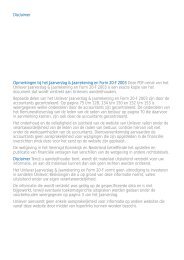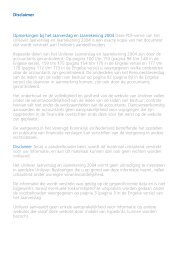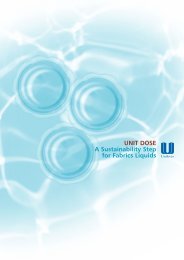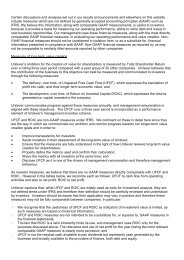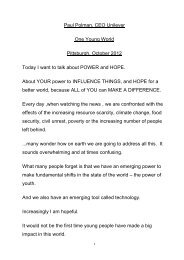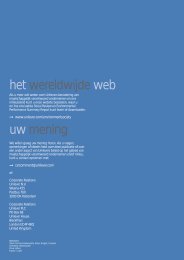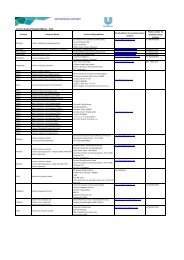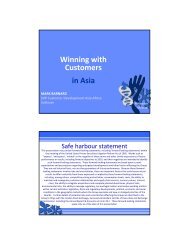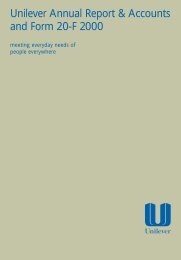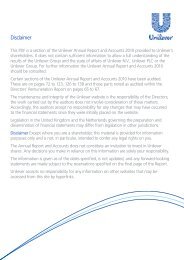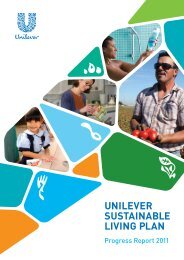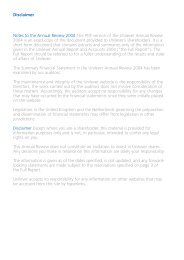Meeting everyday needs of people everywhere - Unilever
Meeting everyday needs of people everywhere - Unilever
Meeting everyday needs of people everywhere - Unilever
You also want an ePaper? Increase the reach of your titles
YUMPU automatically turns print PDFs into web optimized ePapers that Google loves.
Operating review<br />
sustainability indicators in tea production. Similar pilots<br />
are under way in palm oil, spinach, peas and tomatoes<br />
in eight other countries.<br />
<strong>Unilever</strong>’s commitment to sustainability was recognised<br />
in 1999 with our inclusion in the Dow Jones Sustainability<br />
Group Index. This index uses a systematic methodology to<br />
identify companies that lead the way in taking a strategic<br />
approach towards sustainable business development.<br />
Responsible corporate behaviour<br />
<strong>Unilever</strong> is committed to the highest standards <strong>of</strong><br />
corporate behaviour towards its employees, consumers<br />
and the societies in which we operate.<br />
This commitment is at the heart <strong>of</strong> the <strong>Unilever</strong><br />
Corporate Purpose, and is reflected in the Company’s<br />
Code <strong>of</strong> Business Principles. This code sets the framework<br />
for worldwide operational standards, covering issues<br />
such as employee health and safety, product quality<br />
and environmental impact. All Company chairmen are<br />
required to give positive assurance that these policies<br />
and principles are adhered to, and compliance is audited<br />
on a regular basis.<br />
To succeed as a ‘multi-local multinational’, it is essential<br />
that <strong>Unilever</strong>’s operating companies stay close to<br />
and understand evolving consumer <strong>needs</strong> and values.<br />
<strong>Unilever</strong>’s long-term commitment means that not only are<br />
our branded products and services instrumental in raising<br />
living standards, but our policies <strong>of</strong> developing employees<br />
and business partners also contribute to economic<br />
development locally.<br />
As well as pursuing high standards in our business<br />
practices, we also recognise <strong>Unilever</strong>’s responsibility to<br />
wider society. We are committed to working directly and<br />
in partnership with public authorities and a range <strong>of</strong><br />
different organisations to address important social,<br />
economic and environmental challenges. Around the<br />
world <strong>Unilever</strong> companies are active in projects that<br />
contribute to sustainable development and in initiatives<br />
to raise standards <strong>of</strong> education and health both among<br />
employees and in local communities.<br />
In 1999 our companies spent around Fl. 85 million on<br />
community involvement and almost Fl. 10 million w a s<br />
contributed to disaster relief projects in countries as far<br />
apart as Turkey, Taiwan and Colombia.<br />
How companies interact with society is attracting<br />
increasing attention. We believe corporate social<br />
responsibility should be managed as pr<strong>of</strong>essionally as any<br />
other business discipline. In the year 2000, several<br />
<strong>Unilever</strong> companies in different parts <strong>of</strong> the world are<br />
testing a framework to evaluate our performance in this<br />
area. The outcome <strong>of</strong> the project will help us to develop<br />
a consistent <strong>Unilever</strong> approach to managing corporate<br />
social responsibility in diverse cultures. It will also enable<br />
us to share good practice which will strengthen our local<br />
contribution around the world.<br />
Conducting our business with respect for the communities<br />
where we operate is not only responsible corporate<br />
behaviour, it also makes good business sense. We will<br />
continue to strive to meet the highest standards and<br />
to enhance <strong>Unilever</strong>’s reputation as a company that<br />
recognises its wider corporate responsibilities.<br />
Competition<br />
We have a wide and diverse set <strong>of</strong> competitors in our<br />
consumer goods businesses. Many <strong>of</strong> our competitors<br />
also operate on an international scale, but others have<br />
a narrower regional or local focus.<br />
Competition is intense and challenging. We aim to<br />
c o m p e t e and give value to our consumers and customers<br />
i n t h ree ways:<br />
•<br />
•<br />
•<br />
by continually developing new and improved products;<br />
by sharing our innovations and concepts with our<br />
businesses all around the world; and<br />
by striving to lower the cost <strong>of</strong> our sourcing,<br />
manufacturing and distribution processes whilst still<br />
maintaining, and improving, the quality <strong>of</strong> our<br />
products.<br />
We support efforts to create a more open competitive<br />
environment through the liberalisation <strong>of</strong> international<br />
trade. We also support the fuller implementation <strong>of</strong> the<br />
Single European Market and inclusion <strong>of</strong> other European<br />
countries in the European Union.<br />
Exports<br />
We sell our products in nearly all countries throughout<br />
the world and manufacture in many <strong>of</strong> them. Inside the<br />
European Union we make many <strong>of</strong> our products in only<br />
a few countries, for sale in all <strong>of</strong> them.<br />
We also export a wide range <strong>of</strong> products to countries<br />
where we do not make them. We <strong>of</strong>ten use this export<br />
trade to develop new markets before building local<br />
manufacturing facilities, usually through our facilities<br />
in neighbouring countries.



